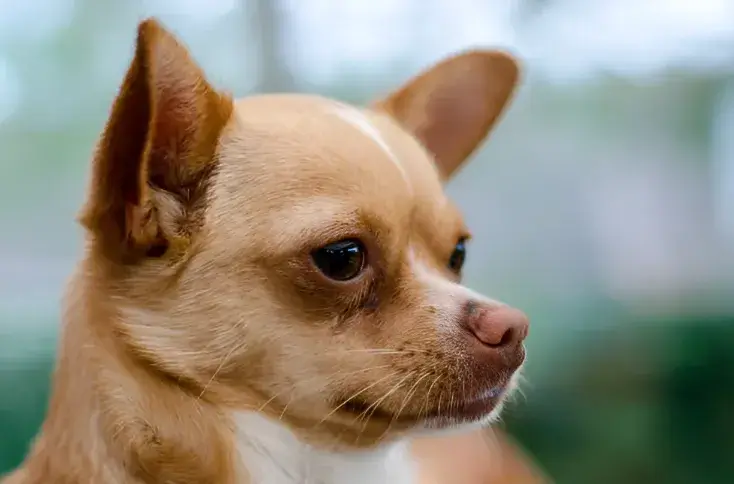While Chihuahuas are famously the smallest dog breed, there are some natural variations within the breed that can result in slightly larger dogs. Let’s explore why some Chihuahuas might grow a bit bigger than others.
The Breed Standard
The American Kennel Club (AKC) sets the official standard for purebred Chihuahuas. Within this standard, a Chihuahua shouldn’t exceed 6 pounds in weight. They are meant to be truly tiny, fitting comfortably in a purse or tote bag.
Deer Head Chihuahuas: Naturally a Bit Bigger
One of the biggest factors affecting size is head shape. Deer head Chihuahuas have a longer muzzle, slightly larger skull, and longer legs than their apple-headed counterparts. This makes them generally larger, though they still fall within the official breed standard.
Long Coat Chihuahuas: The Fur Factor
Fluffy, long-haired Chihuahuas often look much bigger than the smooth-coated variety. However, their underlying skeletal structure is essentially the same – the extra fur just creates an illusion of size.
The Teacup Controversy: Size vs. Health
Some breeders market extremely small Chihuahuas as “teacups.” It’s important to know that this isn’t an official designation. Sadly, breeding for excessively small sizes often comes at the expense of the dog’s health. They are prone to a range of problems, including heart defects and fragile bones.
Embracing Healthy, Slightly Larger Chihuahuas

If you love Chihuahuas but are open to a slightly larger individual, consider adoption! Many wonderful Chihuahuas or Chihuahua mixes in shelters might fall just outside the breed standard but are perfectly healthy, with that same big personality the breed is known for.
Meet the Breed: The Charming Chihuahua
- Breed Standard Weight: Up to 6 pounds
- Head Shapes: Deer head (longer muzzle) and apple head (rounded dome)
- Lifespan: 14-18 years (surprisingly long!)
- Personality Traits: Feisty, loyal, alert, surprisingly athletic
Caring for a Slightly Larger Chihuahua
The essential care needs of a slightly larger Chihuahua are very similar to those of their standard-sized counterparts. Here are the key points to remember:
- Exercise: Daily walks and fun play sessions are still crucial to maintain their health and fitness, even with their slightly bigger build.
- Nutrition: Since they might be a bit more active, consult your veterinarian about the best food and appropriate portion sizes for your individual dog.
- Regular Health Checks: Routine veterinary care is important for all dogs, and your vet can help monitor your Chihuahua’s weight and overall health.
Personal Stories: Big Hearts in Slightly Bigger Packages
Max, a charming deer head Chihuahua adopted from a shelter, weighs in at a whopping 7 pounds. While slightly larger than the breed standard, Max is a picture of health. He loves his daily walks and agility training, always eager to show off his surprising athleticism. His owner wouldn’t trade his big personality (and slightly bigger size) for anything!
Similar Looking Breeds
Here are a few dogs breeds sometimes mistaken for Chihuahuas due to their appearance:
- Miniature Pinscher: More leggy and athletic than Chihuahuas.
- Papillon: Known for their butterfly-like ears.
- Russian Toy: Quite rare, but similar in size with a feathery coat.
Conclusion
Chihuahuas are beloved for their tiny stature and big personalities. Understanding variations within the breed and the health implications of “teacup” breeding can help you find the perfect Chihuahua companion – whether they perfectly fit the breed standard or fall charmingly outside those measurements.
The photo featured below the post headline is Credit: Kim Schou/gettyimages
I hope you find this post helpful and informative. If Yes’ feel free to share it with your friends!
Frequently Asked Question
Is there such a thing as a big Chihuahua?
Not officially. While some Chihuahuas are bigger than others, they’re still classified as a toy breed.
Can a deer head Chihuahua exceed 6 pounds?
Yes, some healthy deer head Chihuahuas may slightly exceed the breed standard’s weight limit.
Is it healthier to get a slightly larger Chihuahua?
Often, yes. Chihuahuas falling slightly outside the standard tend to have fewer health issues associated with breeding for extreme smallness.
What are the seven types of Chihuahuas?
While there aren’t technically seven types, Chihuahuas come in many variations. These include differences in head shape (deer head vs. apple head), coat length (long or short), color, and even slight variations in size.
How big do deer head Chihuahuas get?
Deer head Chihuahuas tend to be the largest variety. A healthy deer head Chihuahua may reach 10-12 inches in height and weigh slightly above the 6-pound breed standard limit.
Are long-haired Chihuahuas bigger than short-haired Chihuahuas?
Their underlying bone structure is very similar. Long-haired Chihuahuas just appear larger due to their fluffy coats.
Do bigger Chihuahuas need more exercise?
Slightly larger Chihuahuas still have the energy levels of this small breed. They will benefit from similar amounts of daily exercise and play as standard-sized Chihuahuas.
Why is my Chihuahua so big?
Several factors could be at play. Your Chihuahua might be a deer head, have mixed breed heritage, or have a health condition that affects their size. Consult with your veterinarian to explore the possibilities.
Are deer head Chihuahuas more aggressive?
There’s no evidence to suggest deer head Chihuahuas are naturally more aggressive. Like all dogs, their personality depends heavily on individual temperament, training, and socialization.
How can I tell if my Chihuahua is overweight?
You should be able to feel your Chihuahua’s ribs easily, and they should have a visible waistline when viewed from above. If you’re unsure, your veterinarian can assess their body condition.

